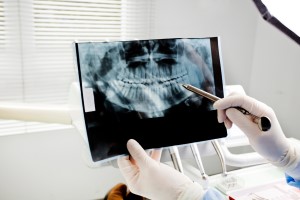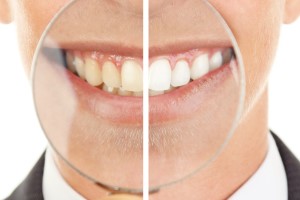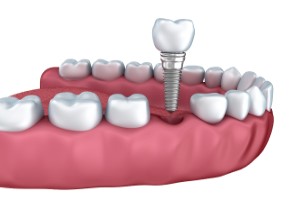When Is Gum Disease Treatment Necessary?

Gum disease is a serious condition that can result in a need for periodontal treatment. Treatment is needed in order to destroy the infection and prevent it from getting worse. Oftentimes, without treatment, a case of gum disease can become advanced, which can result in tooth loss, receding gums, and even jaw deterioration, all of which can be detrimental and irreversible.
Because of how serious gum disease is, it is important to be on the lookout for any signs that may indicate a need for general dentistry treatment. Keep reading to find out when periodontal treatment is necessary.
Indicators that periodontal treatment is needed
Outlined below are a few warning signs of gum disease. These should never go ignored and oftentimes require immediate periodontal treatment.
Red or white gums
When an individual notices that their gums have red or white areas or patches on them, periodontal treatment is likely needed. Gum disease often shows itself in the form of atypical gum colors, which is why it is important to carefully inspect the gums regularly. Soft tissues that are not pink are a cause of concern and should be looked at by a general dentist right away.
Inflammation or swelling
When the gums are swollen or inflamed then it also likely means that periodontal treatment is needed. The gums should never appear to be bulging or puffy, as this indicates a serious stage of gum disease. Until a general dentistry evaluation can be done, taking an over-the-counter anti-inflammatory medication can be helpful in reducing the symptoms.
Bleeding
From time to time, the gums may bleed when brushing or flossing, which is actually normal. However, what is not normal is when the gums bleed excessively. Individuals who suffer from gum disease will likely experience bleeding gums every time they brush or floss and sometimes when eating too. In severe cases of gum disease, there might even be bleeding when no activity is taking place at all. This indicates a serious case of gum disease. Periodontal treatment should be sought if there are any signs of abnormal bleeding.
Pain
Later stages of gum disease often cause pain in the gums because the infection has made its way to the nerves. Sore gums or sharp pains in the soft tissues should not be ignored, as both indicate a need for periodontal treatment from a dentist. Over-the-counter pain medication can be taken to remedy the discomfort until a dentist can start treatment.
Other things to note
Treatment for gum disease is needed in order to maintain good oral health. Additionally, those who are preparing to undergo an intense dentistry procedure may need to have their gum disease tackled first. Examples include dental implant placement or a smile makeover. Dentists will require a 100% healthy mouth prior to starting the process, which is why any signs of gum disease should be immediately taken to a general dentist.
The gums play a vital role in the entire oral cavity as they keep the teeth held in proper position and protect the bone. Because of their importance, it is crucial to maintain good gum health. There are a few ways to do this, thus reducing the chances that gum disease ever develops.
How to maintain good gum health:
- Brush the teeth and along the gum line at least twice a day or after every meal
- Floss once a day carefully and gently
- Use different pieces of floss for the top and bottom arch of teeth. This reduces the chances of transmitting bacteria
- Rinse with salt water or a non-alcoholic mouthwash to rid the oral cavity of bacteria
- Visit the dentist at least twice a year or every six months
- Avoid excessive alcohol consumption and tobacco use
- Eat a diet consisting of healthy foods, such as fruits and vegetables
These recommendations can go a long way in avoiding gum disease as a whole.
Get started with gum disease treatment
The warning signs listed above indicate a need for periodontal treatment. However, there are also times in which gum disease is present but there may not be any indicators, which is why it is important to regularly see a dentist for check-ups. Dentists are trained to catch warning signs that may not be as obvious to the naked eye. Undergoing routine cleanings and examinations can help avoid gum disease and allow an individual to start treatment sooner rather than later. Reach out today to learn more or to get started with a consultation.
Request an appointment here: https://jacksonheightdental.com or call 82nd St. Dental at (718) 476-5555 for an appointment in our Jackson Heights office.
Check out what others are saying about our dental services on Yelp: Gum Disease in Jackson Heights, NY.
Recent Posts
Curious about laser dentistry? Read on to learn more about this type of treatment. Medical professionals may modify or remove tiny quantities of tissue using lasers. While laser surgery has numerous applications outside of dentistry, the vast majority of patients had never ever heard of laser dentistry until they needed it. Dentists employ lasers for…
The use of laser dentistry to treat a variety of dental issues has been commercially available since 1989. Lasers are a less painful and more efficient option than the drills and tools used in traditional dental treatment procedures. Many patients also feel more comfortable with the sounds and feel of laser treatment. Laser treatment options…
Understanding that laser dentistry is a treatment option for addressing cavities means that dental patients have choices. While not all dental professionals offer laser treatment, many now do as they want to offer their patients treatments that use advanced dental technologies. According to WebMD, lasers may preserve more healthy tooth tissue during cavity treatment.Thinking laser…
Dental bonding is one of the most versatile and minimally invasive restorative and cosmetic dental procedures. Dental bonding is the go-to procedure for many patients looking to fix imperfections or enhance their smile, from enhancing the appearance and shape of teeth to repairing damaged enamel. Whether you are new to cosmetic dentistry or considering touch-ups…






